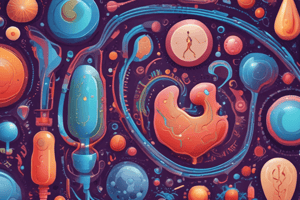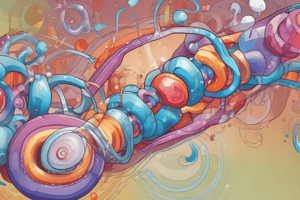Podcast
Questions and Answers
What is the normal range of fasting blood glucose?
What is the normal range of fasting blood glucose?
- < 80 mg/dL
- < 150 mg/dL
- < 120 mg/dL
- < 100 mg/dL (correct)
The liver plays a minor role in maintaining blood glucose.
The liver plays a minor role in maintaining blood glucose.
False (B)
What is the main function of insulin in glucose homeostasis?
What is the main function of insulin in glucose homeostasis?
to lower blood glucose
The organs mainly concerned with glucose storage and release are: liver, muscles, ______________, and kidney.
The organs mainly concerned with glucose storage and release are: liver, muscles, ______________, and kidney.
Reactive hypoglycaemia is often related to the absolute value of blood glucose rather than the rate of fall.
Reactive hypoglycaemia is often related to the absolute value of blood glucose rather than the rate of fall.
Match the hormones with their functions in glucose homeostasis:
Match the hormones with their functions in glucose homeostasis:
What is the primary difference between Hyperosmolar Hyperglycaemic State (HHS) and Diabetic Ketoacidosis (DKA)?
What is the primary difference between Hyperosmolar Hyperglycaemic State (HHS) and Diabetic Ketoacidosis (DKA)?
What is the venous plasma glucose level that indicates hypoglycaemia?
What is the venous plasma glucose level that indicates hypoglycaemia?
In Hyperosmolar Hyperglycaemic State (HHS), the plasma osmolality is typically greater than _______________________ mosm/kg.
In Hyperosmolar Hyperglycaemic State (HHS), the plasma osmolality is typically greater than _______________________ mosm/kg.
Match the following causes of hypoglycaemia with their respective categories:
Match the following causes of hypoglycaemia with their respective categories:
What is the treatment for Hyperosmolar Hyperglycaemic State (HHS)?
What is the treatment for Hyperosmolar Hyperglycaemic State (HHS)?
In Hyperosmolar Hyperglycaemic State (HHS), ketosis is usually present.
In Hyperosmolar Hyperglycaemic State (HHS), ketosis is usually present.
In the management of hypoglycaemia, I.V _______________________ may be administered instead of normal saline.
In the management of hypoglycaemia, I.V _______________________ may be administered instead of normal saline.
What is the effect of insulin on glycogenolysis in the liver?
What is the effect of insulin on glycogenolysis in the liver?
Type 1 diabetes can only occur in young non-obese subjects.
Type 1 diabetes can only occur in young non-obese subjects.
What is the enzyme responsible for inactivating GLP-1 and GIP in the circulation?
What is the enzyme responsible for inactivating GLP-1 and GIP in the circulation?
The primary function of GLP-1 is to increase the release of ______________.
The primary function of GLP-1 is to increase the release of ______________.
What is a common symptom of type 1 diabetes?
What is a common symptom of type 1 diabetes?
Match the following tissues with the process activated by insulin:
Match the following tissues with the process activated by insulin:
Insulin stimulates ketone body formation.
Insulin stimulates ketone body formation.
What is the treatment for type 1 diabetes?
What is the treatment for type 1 diabetes?
Flashcards are hidden until you start studying
Study Notes
Vagal Stimulation and Glucose Regulation
- Vagal stimulation releases GLP-1 and GIP, which are inactivated by dipeptidyl peptidase-4 (DPP-4) enzyme.
- GLP-1 and GIP stimulate insulin release and decrease glucose levels.
- Insulin promotes glycogen synthesis, protein synthesis, and triglyceride synthesis in the liver, and glucose uptake in muscles and adipose tissue.
Effects of Insulin on Cellular Metabolism
- In the liver, insulin stimulates glycogen synthesis, protein synthesis, and triglyceride synthesis, and inhibits glycogenolysis, gluconeogenesis, and ketone body formation.
- In muscles, insulin stimulates glucose uptake and glycogen synthesis, and inhibits glycogenolysis.
- In adipose tissue, insulin stimulates glucose uptake and utilization, and inhibits lipolysis.
Type 1 Diabetes
- Type 1 diabetes is characterized by little or no insulin secretion.
- It is an autoimmune condition with genetic and environmental factors.
- It can occur at any age, but usually presents acutely in young, non-obese individuals.
- Symptoms include polyuria, thirst, glycosuria, weight loss, and ketoacidosis.
Hyperosmolar Hyperglycaemic State (HHS)
- HHS occurs in older patients, usually with type 2 diabetes.
- It develops slowly over days, leading to extreme dehydration and hyperglycaemia (>50mmol/L).
- Treatment involves administration of fluids and insulin.
Hypoglycaemia
- Hypoglycaemia is defined as a venous plasma glucose level < 50 mg/dL.
- It is often related to the rate of fall in blood glucose rather than the absolute value.
- Categories include reactive hypoglycaemia and fasting hypoglycaemia.
Reactive Hypoglycaemia
- Causes of reactive hypoglycaemia include:
- Insulin overdose
- Sulfonylureas
- Salicylate overdose in children
- Poisons
- Galactosaemia
- Hereditary fructose intolerance
- Alcohol intake
- Idiopathic factors
Fasting Hypoglycaemia
- Causes of fasting hypoglycaemia include:
- Enhanced glucose utilisation due to endogenous insulin overproduction
- Defective glucose production due to:
- Endocrine disorders
- Liver disease
- Renal disease
- Miscellaneous factors such as severe malnutrition, starvation, glycogen storage disease, etc.
Studying That Suits You
Use AI to generate personalized quizzes and flashcards to suit your learning preferences.




